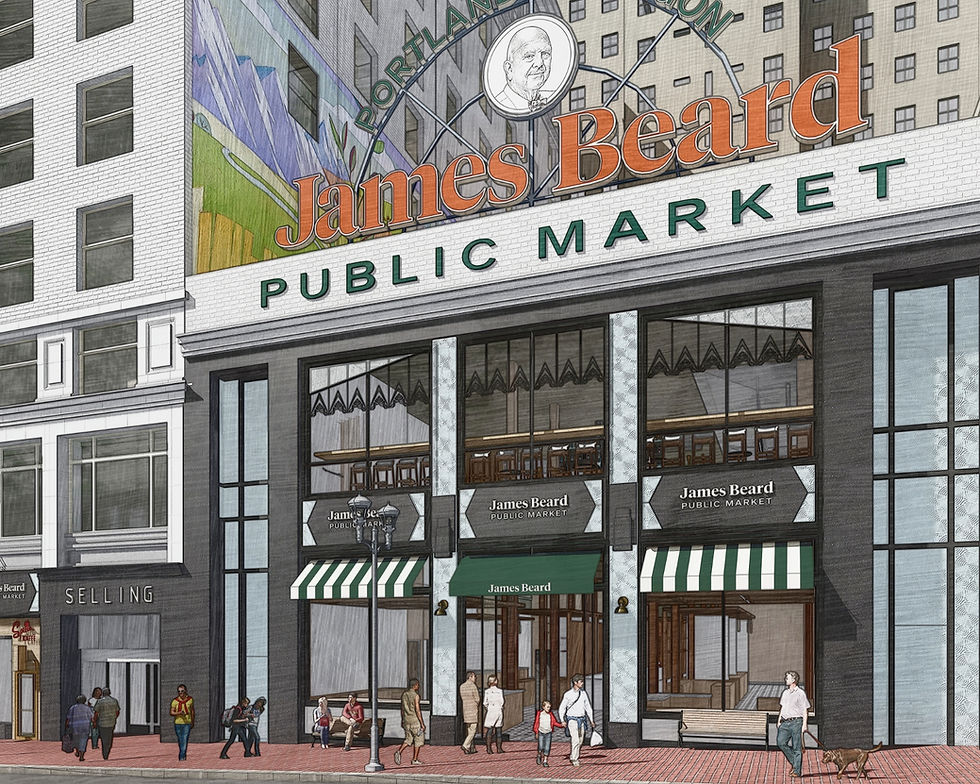James Beard Public Market
- Jul 13, 2025
- 3 min read
Updated: Jul 28, 2025

James Beard Public Market. Honoring a Culinary Legacy in the Heart of Portland
“The secret of good cooking is, first, having a love of it.”
— James Beard
The Story
Long before Portland, Oregon became a national foodie destination, a boy named James Beard was growing up on its tree-lined streets. Born in 1903 and raised in the heart of the city, Beard would go on to transform American food culture as we know it. A pioneering cookbook author, journalist, teacher, and one of the earliest television food personalities, Beard helped shape what we now call modern American cuisine one rooted in local ingredients, cultural diversity, and the pleasures of everyday cooking. Dubbed the “Dean of American Cookery” by The New York Times, Beard championed the flavors of home long before they were celebrated by the mainstream. As Julia Child once said, “I may have brought French cooking to America, but Jim brought American cooking to America.”
Affectionately known as “America’s First Foodie,” Beard’s name has become a symbol of culinary excellence, inclusivity, and authenticity. Through his books, mentorship, and passion, he inspired generations of home cooks and professional chefs alike.
A Legacy of American Food
When James passed away at the age of 81 in 1985, he left behind more than recipes he left a legacy. One that continues to shape kitchens, farmers markets, and food movements across the country. His philosophy centered around seasonality, simplicity, regional tradition, and joy values that resonate more today than ever. It’s only fitting, then, that "Portland’s most ambitious food project" bears his name. The James Beard Public Market is not just a tribute it’s a continuation of his vision: a vibrant, inclusive, and community-rooted place where food brings people together.

Scheduled to open in summer 2026, the James Beard Public Market will invigorate downtown Portland and catalyze future food cultures in a dynamic indoor/outdoor venue open seven days a week.
The James Beard Public Market is more than a marketplace, it’s a movement. In a time when food can feel disconnected from its origins, this market is a return to local values, real ingredients, and human connection. The Market will be a community-focused space by celebrating the best of Oregon’s food and culture.
About the Market
The market promises a one-of-a-kind, authentic experience featuring a rich diversity of vendors offering:
Fresh produce from regional farms- Local dairy products & artisan cheeses- Fishmonger: Wild caught fish - Butcher shop: meats & game- Fresh flowers, herbs, - Value-added food goods- Locally roasted coffee- Craft beer -Regional wines- Small-batch spirits.
Open year-round, the venue will be a hub for locally owned businesses, with the express goal of encouraging healthy eating and food access for people of all cultural and economic backgrounds.
Some vendors will be well-known favorites, while others will be emerging food entrepreneurs supported by the market’s incubator programs with a strong focus on uplifting disadvantaged and underrepresented communities.
As a true market for all, people from across the region regardless of income, ethnicity, or neighborhood will find high-quality, meaningful food experiences created by the small businesses that power Portland’s food identity.
The Bigger Picture

The James Beard Public Market is more than a place to shop it’s a place to gather, discover, and connect. It honors Portland’s culinary roots and James Beard’s legacy, while building a more equitable, community-driven food future.
By giving space to local producers and supporting underrepresented food entrepreneurs, it helps make fresh, culturally relevant food more accessible to everyone. It celebrates both heritage and innovation whether you're shopping for dinner, meeting a friend for coffee, or simply exploring what Oregon tastes like.
In James Beard’s hometown, this market will become a living tribute to the values he held dear: good food, shared joy, and pride in where and how we eat.


Comments